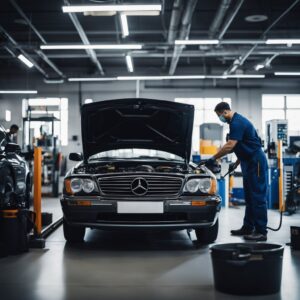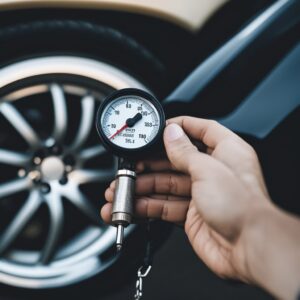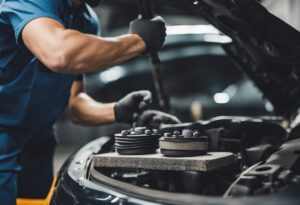Car engines are a complex and essential component of any vehicle. They power the car, providing it with the necessary movement and performance. However, many car owners tend to pay attention to engine maintenance until something goes wrong, which can be costly and inconvenient.
Regular engine maintenance is crucial for ensuring that your car runs smoothly and efficiently. It not only improves the car’s performance but also increases its lifespan. Understanding how to maintain your car engine can be overwhelming for a beginner. But don’t worry—here is a detailed guide to help you get started on proper car engine maintenance.
Why is Engine Maintenance Important?
The engine is like the heart of your car; just like our hearts require care and attention, so does the engine. Regular maintenance helps to identify and fix potential issues before they become major problems that can lead to breakdowns or expensive repairs.
Moreover, a well-maintained engine improves fuel efficiency and reduces emissions, making it more environmentally friendly. It also ensures a safer driving experience by minimizing the chances of accidents caused by sudden engine failures.
Engine Maintenance Checklist
Regular Oil Changes
Engine oil plays a critical role in keeping the engine running smoothly by lubricating its moving parts. Over time, dirt and debris can contaminate the oil, reducing its effectiveness. Regular oil changes are essential in maintaining the health and longevity of your vehicle’s engine.
Importance of Regular Oil Changes
Regular oil changes offer numerous benefits to your car, including:
- Improved Engine Performance: Fresh, clean oil reduces friction between moving parts, allowing them to function more efficiently. This enhances engine performance and boosts fuel efficiency.
- Extended Engine Life: Regular oil changes help to remove dirt and debris that can cause wear and tear on the engine. This helps to extend its lifespan, saving you from costly repairs or replacements in the future.
- Better Fuel Efficiency: As mentioned earlier, fresh oil reduces friction, improving your car’s fuel efficiency by up to 2%. By doing this, you’ll cut down on gas expenses and decrease your carbon footprint.
- Environmental Benefits: Old, dirty oil significantly contributes to air pollution. Regular oil changes ensure that your vehicle emits fewer pollutants, making it more environmentally friendly.
Check and Replace Air Filters
Air filters are crucial in protecting your engine from dust, debris, and other contaminants. Over time, they get clogged with particles, reducing airflow to the engine and affecting its performance. Regularly checking and replacing air filters can help maintain optimal engine efficiency. Here are some steps to follow:
- Locate the air filter: The air filter is usually located in a black plastic box near the engine. Please consult your vehicle’s owner’s manual for detailed guidelines.
- Remove the old filter: Once you have located the air filter, carefully open the top of the box and remove the old filter.
- Inspect the new filter: Inspect it for any damages or defects before installing it.
- Install the new filter: Place it in the box, ensuring it fits snugly. Close the lid tightly to ensure no unfiltered air enters the engine.
- Check regularly: It is recommended to check and replace your air filters every 12 months or every 12,000 miles, whichever comes first.
Regularly Check Fluid Levels
Fluids such as coolant, transmission, and brake fluid are essential for your car’s proper functioning. Regularly checking their levels is crucial in maintaining a well-functioning engine. Low levels of these fluids can severely damage the engine. It is recommended to check the fluid levels at least once a month or whenever you notice any leakage.
To check coolant levels, locate the coolant reservoir under your car’s hood. Ensure the level is maintained between the minimum and maximum markings on the tank. If it’s below the minimum, refill it with water and antifreeze per your manufacturer’s instructions. It is also essential to flush and replace the coolant every 2-3 years to prevent the build-up of rust and debris in the cooling system.
Transmission fluid levels can be checked by locating the transmission dipstick, usually labelled with a red or yellow handle. Ensure that the engine is warm and the car is level before checking. The fluid should be at the recommended level, and its color should be red or pin If it’s low, add more fluid per your manufacturer’s recommendations.
Brake fluid can also be easily checked by locating the reservoir under the hood. The level should be above the minimum mark on the tank. If it’s below, refill it with the recommended type of brake fluid.
Keep Your Engine Clean
A clean engine is a happy engine. Regularly cleaning the engine bay can help prevent dirt, grime, and debris build-up, which can affect its performance. It also makes it easier to spot any issues that may arise. Here are a few suggestions for maintaining a clean engine::
- Avoid using excessive water: While keeping the engine clean is essential, avoid using excessive water when cleaning, as it can damage sensitive components.
- Use a degreaser: A degreaser can help break down stubborn dirt and grime in the engine bay. Just make sure to choose one that is safe for your engine type.
- Wipe with a damp cloth: After applying the degreaser, use a wet cloth to wipe away the dirt and grime. Avoid using too much pressure as it can cause damage to delicate parts.
- Dry thoroughly: Once you have wiped down the engine bay, dry it thoroughly with a clean towel or air compressor. This will help prevent rust or corrosion from forming on any metal surfaces.
Helpful Tips for Maintaining Your Engine
- Follow the manufacturer’s recommended maintenance schedule.
- Keep track of your car’s mileage to determine when to perform specific maintenance tasks.
- As the manufacturer recommends, check and replace spark plugs, wires, and belts.
- Avoid short trips, as they can negatively impact the health of your engine. Try to combine errands into one trip to reduce wear and tear.
- Use your car’s recommended type and fuel grade to prevent engine damage.
- Please pay attention to the warning lights on your dashboard and fix them immediately.
- If you notice any strange noises or smells coming from your engine, have it inspected by a qualified mechanic.
- Record all maintenance tasks performed on your car for future reference.
By following these tips and regularly maintaining your engine, you can ensure your car runs smoothly and efficiently for years. Not only will this save you from costly repairs, but it will also help reduce your carbon footprint and contribute to a cleaner environment.
Conclusion
Regular maintenance is crucial in keeping your car’s engine running smoothly and efficiently. It ensures a longer lifespan for your vehicle, improves its performance, and reduces the risk of accidents.
By following this simple engine maintenance checklist, you can save yourself from costly repairs and have peace of mind knowing that your car is in top-notch condition. So, make sure to schedule regular oil changes, check and replace air filters, monitor fluid levels, and keep your engine clean.
FAQs – Frequently Asked Questions
How often should I get an oil change?
It is recommended to get an oil change every 5,000-7,500 miles or every six months, whichever comes first. However, for optimal performance, it’s best to follow your car manufacturer’s recommendations.
Why are regular oil changes necessary?
Regular oil changes help to remove dirt and debris, reduce friction between moving parts, extend engine life, improve fuel efficiency, and have environmental benefits.
How often should I check my fluid levels?
You should check your fluid levels at least once a month or whenever you notice any leakage.
What happens if I neglect to change my air filters?
Neglecting to change air filters can lead to reduced airflow to the engine, affecting its performance and fuel efficiency. It can also result in more pollutants being emitted into the environment.
Can I replace the air filter myself?
Yes, replacing an air filter is a simple task that can be done at home. However, make sure to follow your car manufacturer’s instructions for best results.
What type of coolant should I use?
For the recommended type and mix ratio of coolant for your specific vehicle, it’s best to refer to your car owner’s manual.
Why should I maintain a clean engine?
A clean engine helps improve performance, prevent damage, and make it easier to spot any potential issues. It also adds to the overall appearance and value of your vehicle. Regular maintenance is essential for a well-functioning engine and a safe driving experience. If you have further questions or concerns, it’s always best to consult a professional mechanic for expert advice.




